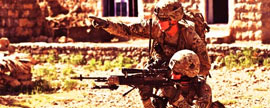Bottomline
Not necessarily
Discussion
Corrective Training Aspect
Having a Soldier write an essay on the importance of sanitation meets the requirements of corrective training. Specifically:
- It was not punishment
- It was directly related to the observed deficiency
- It specifically addressed the observed deficiency
- It was discontinued once the deficiency was correct
So your corrective training process was correct.
1SG’s Point of View
You stated the 1SG had you sitting in the orderly room doing nothing because he was unhappy with your decision to administer corrective training. I cannot tell you if the 1SG is right or wrong, just as I cannot tell you if you were right or wrong in your decision.
However, there are two details that immediately jumped out at me when I read your question. First you administered corrective training for failure to wash and dry hands. Was this Soldier a medical or food service person in the performance of their duties? Are you working under specific conditions that warrant strict adherence to sanitation? If not then perhaps your corrective training (essay) was a bit excessive. This incident might have been more appropriately been handled via a face to face discussion with the Soldier on the importance of sanitation within the force. Basically an educational discussion.
Second you stated this Soldier was not your subordinate. While you have authority to administer corrective training it is common courtesy (and appropriate) to discuss such issues and courses of action with the Soldier’s first line leader before taking action. This reduces the likelihood of the issue blowing up or two NCO’s getting into a contest as to whether the Soldier will or will not complete the corrective training.
Your 1SG has years of experience and most likely is simply using his corrective training (having you sit in the orderly room) to give you time to think through your actions and figure out if your course of action was the most appropriate (notice I did not say right or wrong). Apparently it has worked as you contacted me looking for some nuggets of knowledge.
Finally, is your 1SG’s corrective training appropriate? Probably not (within the letter of the law). Was his heart in the right place? Probably.
Summary
In both cases (you and the 1SG), there were probably other alternatives
- You could have had a professional discussion with the Soldier in question and left it at that.
- Your 1SG could have had a professional discussion with you on why he was unhappy with your corrective training.
Bottomline, you need to learn and grow from this experience.
Please Read! Help Us Help Others!
If you think this site is useful please tell your peers, subordinates, and superiors. Also we are always looking for examples, classes, briefings, SOPs, templates and other information we can share for free in the ASKTOP.net Armsroom. Please help us help others by sending your ARMS ROOM stuff to: mark.gerecht@mentorinc.us













